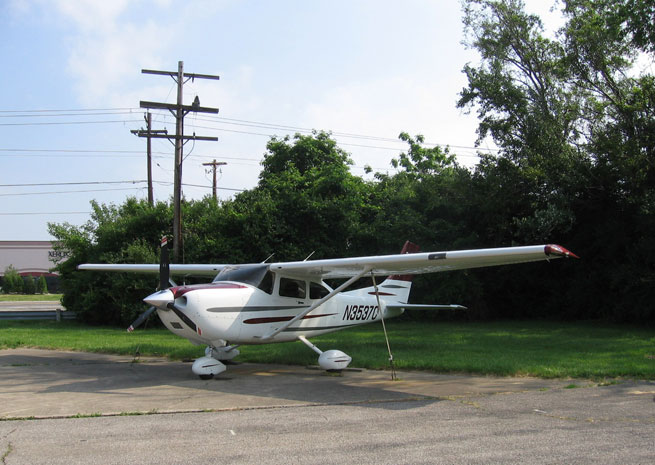Lebanon, Ohio-based Flying Neutrons club, founded in 1952, has managed to survive and thrive despite being forced to move after the global economic recession and the closing of the club’s base airport, Blue Ash Airport, in 2012. The club is now located at Lebanon-Warren County Airport.
The nonprofit Flying Neutrons was founded in 1952 by engineers from the nearby General Electric engine plant in Evendale, Ohio, which is now one of the world's largest jet engine facilities, said President Jim Witte via email. “The engineers in 1952 were designing a nuclear aircraft engine for strategic bombers, and the spirit of thoroughness, precision, and innovation you would expect from nuclear aviation engineers continues today,” he said.
The club has 100 members—93 senior members, five junior members, and two light sport aircraft members, said Witte. “Junior members are family of senior members. The main difference between senior and junior members is that junior members pay no initiation fee and pay dues at 50 percent of the senior member monthly rate,” he said.
The Flying Neutrons fleet consists of two Cessna 172s, a Piper Arrow, a Piper Cherokee Six, a 2001 Cessna 182T, and a Paradise light sport aircraft (LSA). “All except the LSA have IFR certified Garmin 430s with WAAS. We also have an Elite IFR PCATD, free of charge for club members,” said Witte.
Senior members who pay a $2,500 initiation fee are eligible to fly all airplanes. Senior members who pay $1,250 are eligible to fly the two Cessna Skyhawks and the Paradise LSA. And senior members who pay an $800 initiation fee are only eligible to fly the Paradise LSA, which was recently added to the club’s fleet.
“You can upgrade at any time by paying the difference between the levels. If at some point you decide to leave the club, half of your initiation fee is returned to you,” said Witte. “We have a cap on membership of 120 senior members. That might be reviewed now that we have added the LSA to our fleet.”
The new LSA was owned by Nelda Lane, the widow of Jon Lane, who was responsible for the creation of Lebanon-Warren County Airport, said Witte. “Both John and Nelda were pilots. Following John’s death and the relocation of the Flying Neutrons to the airport, Nelda became acquainted with the club,” he said. “She liked the club’s emphasis on safety, friendship and affordable flying. Nelda offered to allow the club to purchase the LSA at a slight discount to show support for the values embodied by the club.”
Club members pay $60 a month and junior members pay $30 a month to cover fixed costs, said Witte. Flight time costs (wet and tach) are: $65 an hour for the Paradise LSA; $115 an hour for the 172s; $140 an hour for the Piper Arrow III; $155 an hour for the Skylane; and $160 an hour for the Cherokee 6.
The club offers flight instruction for $25 an hour, and students pay the standard aircraft rental rates, said Witte. “All instructors must be club members. We currently have 11 instructors available, [but] four or five instructors provide 95 percent of the instruction,” he said. “I estimate we currently have five active students working on their private or IFR.”
Members can attend monthly business meetings on the second Sunday of each month, except the months when the aircraft are washed and waxed, usually in May and October, said Witte. “Monthly business meetings are preceded by a cookout and social hour then about one hour of instruction or presentation,” he said. “In the wash and wax months, we follow the wash and wax with a cookout and business meeting.”
Flying Neutron members sporadically participate in fly-ins in the area, said Witte. “We had three planes and 10 members attend the AOPA fly-in in Indianapolis,” he said. “We have a winter dinner with a guest speaker. The guest speaker is generally on an aviation topic.”
“We invite other pilots to visit us for the education, social, and cookout session each month prior to our monthly business meeting. We also welcome anyone who would like to participate to join us at our bi-annual wash and wax, when the entire fleet is cleaned inside and out with a through washing and waxing form propeller to tail,” said Witte. “It is no surprise that few non-member pilots join us for the cleaning. I think it may make them jealous to see the entire fleet washed and waxed in a single morning. We have had other pilots join us for the cookout that follows the wash and wax.”
Witte offered advice for new clubs: “Decide on the purposes of the club and rank them in order of priority,” he said. “Find a group of like-minded individuals who are willing to volunteer. Organize your finances to avoid or at least minimize surprises. Tell everyone at your airport to spread the word about the club.”



